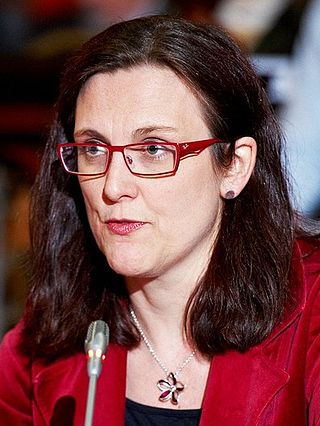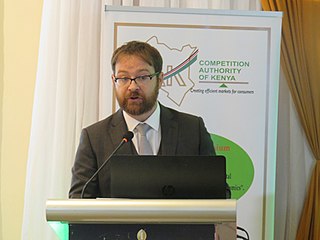Electronic Privacy Information Center (EPIC) is an independent nonprofit research center established in 1994 to protect privacy, freedom of expression, and democratic values in the information age. EPIC is based in Washington, D.C. EPIC's mission is to secure the fundamental right to privacy in the digital age for all people through advocacy, research, and litigation.

The International Chamber of Commerce is the largest, most representative business organization in the world. Its over 45 million members in over 100 countries have interests spanning every sector of private enterprise.
Online dispute resolution (ODR) is a form of dispute resolution which uses technology to facilitate the resolution of disputes between parties. It primarily involves negotiation, mediation or arbitration, or a combination of all three. In this respect it is often seen as being the online equivalent of alternative dispute resolution (ADR). However, ODR can also augment these traditional means of resolving disputes by applying innovative techniques and online technologies to the process.
A privacy policy is a statement or legal document that discloses some or all of the ways a party gathers, uses, discloses, and manages a customer or client's data. Personal information can be anything that can be used to identify an individual, not limited to the person's name, address, date of birth, marital status, contact information, ID issue, and expiry date, financial records, credit information, medical history, where one travels, and intentions to acquire goods and services. In the case of a business, it is often a statement that declares a party's policy on how it collects, stores, and releases personal information it collects. It informs the client what specific information is collected, and whether it is kept confidential, shared with partners, or sold to other firms or enterprises. Privacy policies typically represent a broader, more generalized treatment, as opposed to data use statements, which tend to be more detailed and specific.

Anna Cecilia Malmström is a Swedish politician who served as European Commissioner for Trade from 2014 to 2019. She previously served as European Commissioner for Home Affairs from 2010 to 2014 and Minister for European Union Affairs from 2006 to 2010. She was a Member of the European Parliament (MEP) from Sweden from 1999 to 2006.

The Chartered Trading Standards Institute (CTSI) is a professional association which represents and trains trading standards professionals working in local authorities, business and consumer sectors and in central government in the UK and overseas.
The Multilateral Agreement on Investment (MAI) was a draft agreement negotiated in secret between members of the Organisation for Economic Co-operation and Development (OECD) between 1995 and 1998. It sought to establish a new body of universal investment laws that would grant corporations unconditional rights to engage in financial operations around the world, without any regard to national laws and citizens' rights. The draft gave corporations a right to sue governments if national health, labor or environment legislation threatened their interests. When its draft became public in 1997, it drew widespread criticism from civil society groups and developing countries, particularly over the possibility that the agreement would make it difficult to regulate foreign investors. After an intense global campaign was waged against the MAI by the treaty's critics, the host nation France announced in October 1998 that it would not support the agreement, effectively preventing its adoption due to the OECD's consensus procedures.
Information privacy, data privacy or data protection laws provide a legal framework on how to obtain, use and store data of natural persons. The various laws around the world describe the rights of natural persons to control who is using its data. This includes usually the right to get details on which data is stored, for what purpose and to request the deletion in case the purpose is not given anymore.
The International Safe Harbor Privacy Principles or Safe Harbour Privacy Principles were principles developed between 1998 and 2000 in order to prevent private organizations within the European Union or United States which store customer data from accidentally disclosing or losing personal information. They were overturned on October 6, 2015, by the European Court of Justice (ECJ), which enabled some US companies to comply with privacy laws protecting European Union and Swiss citizens. US companies storing customer data could self-certify that they adhered to 7 principles, to comply with the EU Data Protection Directive and with Swiss requirements. The US Department of Commerce developed privacy frameworks in conjunction with both the European Union and the Federal Data Protection and Information Commissioner of Switzerland.
A competition regulator is the institution that oversees the functioning of markets. It identifies and corrects practices causing market impediments and distortions through competition law. In general it is a government agency, typically a statutory authority, sometimes called an economic regulator, that regulates and enforces competition laws and may sometimes also enforce consumer protection laws. In addition to such agencies, there is often another body responsible for formulating competition policy.

Allan James Asher is an Australian lawyer, consumer advocate and campaigner.
Privacy law is the body of law that deals with the regulating, storing, and using of personally identifiable information, personal healthcare information, and financial information of individuals, which can be collected by governments, public or private organisations, or other individuals. It also applies in the commercial sector to things like trade secrets and the liability that directors, officers, and employees have when handing sensitive information.
Consumer protection is the practice of safeguarding buyers of goods and services, and the public, against unfair practices in the marketplace. Consumer protection measures are often established by law. Such laws are intended to prevent businesses from engaging in fraud or specified unfair practices to gain an advantage over competitors or to mislead consumers. They may also provide additional protection for the general public which may be impacted by a product even when they are not the direct purchaser or consumer of that product. For example, government regulations may require businesses to disclose detailed information about their products—particularly in areas where public health or safety is an issue, such as with food or automobiles.
The United States Commission's fair information practice principles (FIPPs) are guidelines that represent widely accepted concepts concerning fair information practice in an electronic marketplace.
The European Consumer Centres Network (ECC-Net) is an EU-wide network. There is a national contact point called European Consumer Centre (ECC) in all 27 EU Member States, as well as in Iceland and Norway. ECCs provide consumers with information about the opportunities and risks of the European Single Market and also regarding cross-border consumer topics, such as travel, various services, and the purchase of goods and services. The ECC-Net is staffed by legal experts who assist consumers free of charge to solve any dispute that may arise with enterprises based in another EU country, Norway, or Iceland. The ECCs are co-financed by the European Commission and national governments aiming to protect consumer rights and ensure that every EU citizen may take full advantage of the European Single Market. Depending on the formal structure some ECCs are hosted by non-governmental organizations (NGOs), governmental bodies, or independent organizations.

Electronic evidence consists of these two sub-forms:
There are several national data protection authorities across the world, tasked with protecting information privacy. In the European Union and the EFTA member countries, their status was formalized by the Data Protection Directive and they were involved in the Madrid Resolution.

Peter Whelan is a professor of law at the School of Law, University of Leeds. A qualified New York Attorney-at-Law, Whelan conducts research in competition (antitrust) law and criminal law. He published the first full-length monograph on the criminal enforcement of competition law with Oxford University Press.
The Finnish Competition and Consumer Authority is the Competition regulator in Finland. It is the regulatory authority of Politics of Finland which works in the field of competition and consumer rights protection. The purpose of the Finnish Competition and Consumer Authority is to create healthy and effective markets in which companies and other operators act responsibly and in keeping with consumers' interests.





